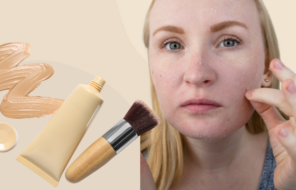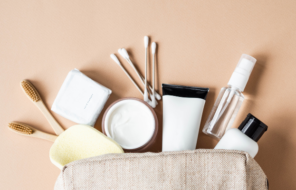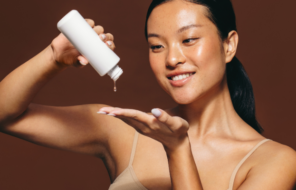Isotretinoin, which is more commonly known though no longer marketed as accutane, is considered the nuclear option for acne. This prescription medication is one of the most, if not the most, effective treatments for acne. Unfortunately, this medication also comes with plenty of side effects. Those of you seeking acne treatments should definitely be aware of accutane, so that you can make an informed decision on whether it is the right acne treatment for you.
In this article, I’ll explain exactly what isotretinoin is and how it works. I’ll break down the benefits of taking accutane, but I’ll also let you know about both the mild and very serious accutane side effects. I give some general details as well, like how long it takes to work, and how it should be used, although it’s important to point out that those are questions you should also ask your dermatologist.
What I can help with, however, is making sure that your skin stays glowy and hydrated while taking isotretinoin, which I do by giving you some skincare routine suggestions. If after reading this article, you think isotretinoin is exactly what your skin needs, then make sure to speak to your dermatologist!
In this article:
- What Is Accutane/Isotretinoin?
- How Accutane Works
- Isotretinoin Benefits
- Mild Isotretinoin/Accutane Side Effects
- Potential Dangers of Isotretinoin
- Who Shouldn’t Take Accutane?
- How to Use Isotretinoin
- How Long Does It Take for Isotretinoin to Work?
- What Are My Other Options?
- Spironolactone vs. Accutane for Acne
- Skin Care Routine on Accutane
What Is Accutane/Isotretinoin?
Also known as accutane, isotretinoin is a retinoid, meaning that it is related to vitamin A. It also has the chemical name 13-cis-retinoic acid. Isotretinoin is an oral prescription medication most usually prescribed for acne. It is extremely effective, but is considered a last resort, since its side-effects can be severe.
The drug was first introduced to the market under the name Accutane, although since becoming generic it has been marketed under many other brand names including Claravis, Myorisan, and Sotret.
How Accutane Works
Accutane works by decreasing the size and activity of the sebaceous glands. The sebaceous glands are little glands that exist just below the top layers of our skin, in the epidermis, and are connected to the hair follicles. They secrete sebum, which is the name for human oil.
When the sebaceous glands are overactive the skin becomes very oily. Often, pores will get clogged with the overabundance of sebum, which can lead to blackheads and whiteheads. If the pore also becomes infected with the acne bacteria, we end up with inflamed pimples.
By slowing down the oil production mechanism and reducing the size of the sebaceous glands, isotretinoin works from the root to prevent one of the core reasons why acne is formed. The exact reason why isotretinoin does this is unknown, but there are a few different theories. It is a monotherapy, meaning that it works on its own, and other treatments like oral or topical antibacterials are not necessary.

Isotretinoin Benefits
- Accutane minimizes the size of the sebaceous glands in the skin, which in turn reduces oil production in the skin and prevents the pores becoming clogged.
- Isotretinoin clears up the skin and reduces or even totally eliminates breakouts.
- Accutane is one of the few acne fighting options that lead to long-term results. After a course or two of accutane, acne will almost never return.
Mild Isotretinoin/Accutane Side Effects
Almost anyone who goes on accutane can expect some side effects. Most people are perfectly willing to tolerate these side effects, since they are not as inconvenient as suffering from severe acne. Isotretinoin also has some more severe potential side-effects that I will list in the next section.
- Dry Skin: Since accutane reduces oil production in the skin, the skin will inevitably become quite dry, with the skin potentially becoming rough, chapping, or peeling. It is very important to keep the skin moisturized whille taking accutane.
- Temporary Increase in Acne: Some people report that in the first month of taking accutane, their acne seems to increase. This is potentially due to the sudden dryness of the skin, and it tends to go away on its own after a few more weeks.
- Chapped Lips: As a side effect of the dry skin, the lips can become very dry and easily chapped. Using lip balms regularly while taking isotretinoin can help with the discomfort.
- Sun Sensitivity: Accutane might make the skin more photosensitive, which means that the skin will burn more quickly and severely than normal if exposed to sunlight. Wearing sunscreen on a daily basis is important while taking accutane.
- Thinner Skin: The skin becomes much thinner and more sensitive in general. It is important to avoid waxing or dermabrasion services while taking accutane, as they can remove a significant amount of skin and cause irritation.
- Dry Mouth and Eyes: Your mouth and eyes might become easily dry, in which case drinking water regularly, sucking on hard candy, and using eye drops should help.
- Pain: Some people might experience muscle or join soreness while taking isotretinoin. If it becomes severe, then consult your doctor.
- Liver Problems: Isotretinoin may cause issues with liver function. You will undergo regular blood tests while taking isotretinoin, and your doctor will monitor your liver functions to ensure everything is okay.
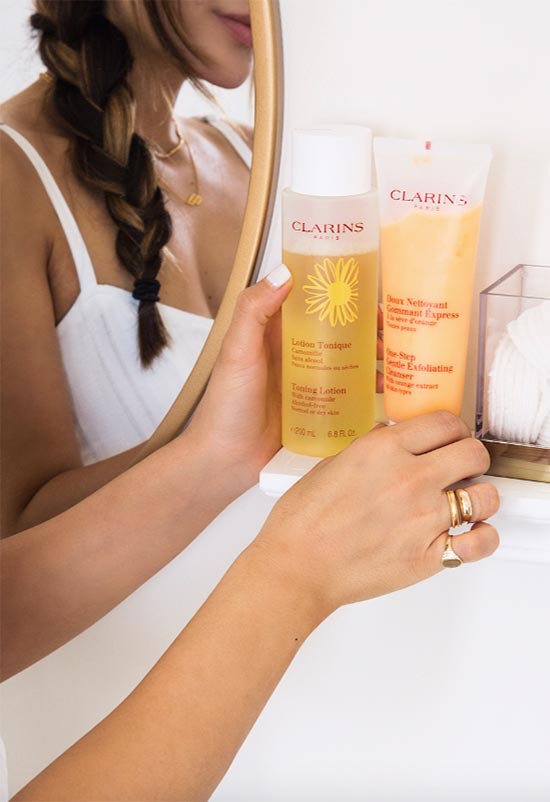
Potential Dangers of Isotretinoin
This is not a comprehensive list of potentially dangerous isotretinoin side effects, but they are ones that pop up slightly more frequently or are more severe. In general, pay close attention to your body while taking any new medication, and let your doctor know if you experience anything different or unexpected, even if it’s not on this list.
However, you absolutely must speak to your doctor if you notice any of the following symptoms, as they can signify much more serious issues.
- Mood Shifts: Some people experience sudden or increased depression, anxiety, or aggression when taking isotretinoin. Pay close attention to your mental state, and let your doctore know about any mood changes you are experiencing.
- Birth Defects: Pregnant people should absolutely not take accutane, as it can cause severe birth defects to the fetus. In most countries women must be on multiple forms of birth control and undergo regular pregnancy tests while taking accutane, in order to ensure that they haven’t become pregnant while taking the medication.
- Migraines and Visual Disturbances: Speak to your doctor if you start experiencing severe or regular headaches, or if you experience any changes to your vision.
- Pancreatitis: This is very rare, but if you experience stomach pain, nausea, or vomiting then stop taking isotretinoin, and speak to your doctor.
- Inflammatory Bowel Disease: If you experience diarrhea then pause taking your accutane, and speak to your doctor.
- Allergic Reaction: Very few people are allergic to accutane, but it is not unheard. Discontinue use and speak to your doctor if you experience rashes, skin inflammation, severe itchiniess, difficulty in breathing, or swelling of the throat.
Who Shouldn’t Take Accutane?
- Those experiencing pregnancy, as accutane can cause severe birth defects
- Anyone currently breastfeeding
- Children under 12
- Anyone with liver problems
- People with high cholesterol or hyperlipidaemia
- Those taking tetracycline-type antibiotics
- People with hypervitaminosis A (a condition caused by overconsumption of vitamin A)

How to Use Isotretinoin
Isotretinoin is an oral medication, meaning that it comes in the form of a capsule and is taken by mouth. Your doctor or pharmacist will give you very clear instructions on how to take accutane, and at all times you must follow their instructions. Your doctor will prescribe you the isotretinoin dose that is right for you.
Isotretinoin capsules are normally taken once or twice a day, around the same time each day, and usually with a beverage. It is normally recommended that the capsule be taken with food, or soon after one has eaten. If you forget to take your isotretinoin capsule, take it as soon as you remember, unless it is time for your next dose in which case do not take a double dose.
Once on isotretinoin, you can expect to see your dermatologist a lot. Because of all of the more severe accutane side effects, regular blood tests are required to ensure healthy blood sugar and healthy liver function, as are regular pregnancy tests.
How Long Does It Take for Isotretinoin to Work?
While the timeline may differ from person to person, most people will usually notice improvement in their skin after around one or two months. For others, it may take up to four months, but almost everyone who goes on accutane eventually sees a positive result.
Normally, one round of accutane treatment will last between 4-6 months, and in cases that the acne is super stubborn the doctor might suggest going on a second round.
What Are My Other Options?
This article is written for the person who has already tried everything, and nothing worked. If you’ve already given the typical acne-fighting topicals like salicylic acid, glycolic acid, tea tree oil, sulfur, and benzoyl peroxide a try, and if you have already tried even stronger prescription options like Retin-A, Differin, or Epiduo to no avail, then it’s time to talk to your dermatologist about the big guns. In addition to accutane, other last resort drugs include spironolactone and antibiotics.
Spironolactone vs. Accutane for Acne
The other drug doctors may prescribe for extremely stubborn acne is spironolactone. Spiro is an androgen blocker, which means that it stops the body from producing as many male hormones.
Since it is those male hormones that are responsible for excessive oil production, the result, similarly to accutane, is reduced oil production in the skin and less breakouts. This reduction in androgen is fine for women, but it means that the drug is never recommended for men.
Spironolactone is extremely effective for hormonal acne, which is usually concentrated around the chin and jawline. However, unlike accutane, spiro is only effective while it is taken, so people might have to stay on it for years in order to prevent acne coming back.
For maximum efficacy spiro is often paired with the birth control pill Yaz, with an oral like doxycycline, and topical treatments like benzoyl peroxide or Retin-A. If you are hoping for a one and done deal then accutane is the way to go, but if you are nervous about the accutane side effects or if you have strictly hormonal acne then spiro will be the better choice.
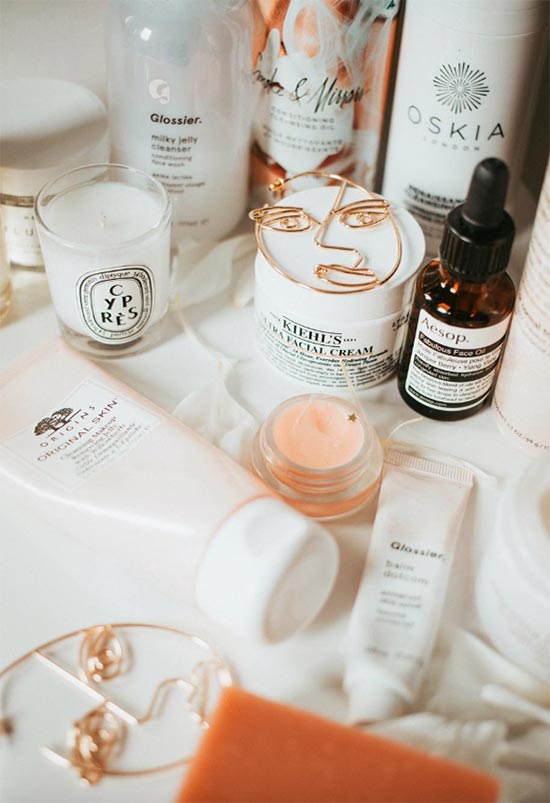
Skin Care Routine on Accutane
Since accutane significantly reduces the size of one’s oil glands, the skin will usually become very dry. That is why sticking to a gentle and hydrating skincare routine while on accutane is so important.
Naturally, you will want to keep your skin clean by using a gentle cleanser every night. The best cleansers will be hydrating and with a low pH. I highly recommend the Philosophy Purity Made Simple Cleanser, which is available at Sephora, or the CosRX Low pH Good Morning Gel Cleanser from Ulta.
Next, it is extremely important to keep the skin well moisturized. This means using a moisturizer twice a day at the very least, although a better routine would be one in which you layer hydrating essences and serums first, and follow them up with more occlusive creams and balms.
The jury is still out on whether using topical exfoliants while taking accutane is a great idea, so it is important that you ask your dermatologist what they think. For some people, both chemical exfoliants, like glycolic and salicylic acid, and physical scrubs will simply be too harsh, since accutane already thins out their skin and makes it more delicate.
Others find that gentle chemical exfoliants are perfect for eliminating the flakiness that isotretinoin sometimes causes, while a different group of people might find that a gentle physical exfoliant does a better job. It is important to note that most dermatologists would recommend staying away from chemical exfoliants while taking accutane.
Photos via @evelyneslava_, Instagram



